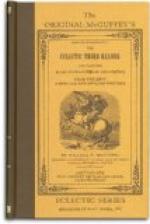[Noted Selections]
The selections in the Rhetorical Guide were made, first of all, to teach the art of reading. There was therefore great variety. Second, to inculcate a love for literature. Therefore the selections were taken from the great writers,—poets, orators, essayists, historians, and preachers. The extracts are wonderfully complete in themselves,—one does not need to read the whole of Byron’s Don Juan to appreciate the six stanzas that describe the thunder-storm on the Alps. Of the poetical extracts all the users of this book will remember Southey’s “Cataract of Lodore” with its exacting drill on the ending,—“ing,” Longfellow’s “Village Blacksmith” and the “Reaper and the Flowers;” Bryant’s “Thanatopsis” and “Song of the Stars;” Wolfe’s “Burial of Sir John Moore;” Gray’s “Elegy;” Mrs. Hemans’s “Landing of the Pilgrim Fathers;” Cowper’s “My Mother’s Picture;” Jones’s “What Constitutes a State;” Scott’s “Lochinvar;” Halleck’s “Marco Bozzaris;” Drake’s “American Flag;” and Mrs. Thrale’s “Three Warnings.” As an introduction to the thought, imagery and diction of Shakespeare, there were “Hamlet’s Soliloquy,” “Speech of Henry Fifth to his Troops,” “Othello’s Apology,” “The Fall of Cardinal Wolsey” and his death, the “Quarrel of Brutus and Cassius” (often committed to memory and spoken) and Antony’s Oration over dead Caesar. The extracts from orations were chosen largely for their relation to great events in history. There were Patrick Henry’s “Speech before the Virginia Convention,” Walpole’s “Reproof of Mr. Pitt,” and Pitt’s reply. Who cannot remember “The atrocious crime of being a young man,” and go on with the context? There were extracts from Hayne’s “Speech on South Carolina,” and Webster’s reply defending Massachusetts; a part of Burke’s long speech on the Trial of Warren Hastings prefaced by Macaulay’s description of the scene; Webster’s “Speech on the Trial of a Murderer,” ending with “It must be confessed, it will be confessed; there is no refuge from confession but suicide, and suicide is confession;” Webster’s speech on the Importance of the Union with its concluding sentiment, “Liberty and Union, now and forever; one and inseparable.” There was also Fox’s “Political Pause” with its wonderful requirements of inflection to express irony; Sprague’s “American Indians,” “Not many generations ago, where you now sit, encircled with all that exalts and embellishes civilized life, the rank thistle nodded in the wind, and the wild fox dug his hole unscared.” Did you not commit it to memory and speak it? Then there was Webster’s Speech in which he supplied John Adams from his own fervid imagination that favorite of all patriotic boys, “Sink or swim, live or die, survive or perish; I give my hand and my heart to this vote.” At its close, “it is my living sentiment, and, by the blessing of God, it shall be my dying sentiment; independence now, and independence forever.”
[Literary Selections]




